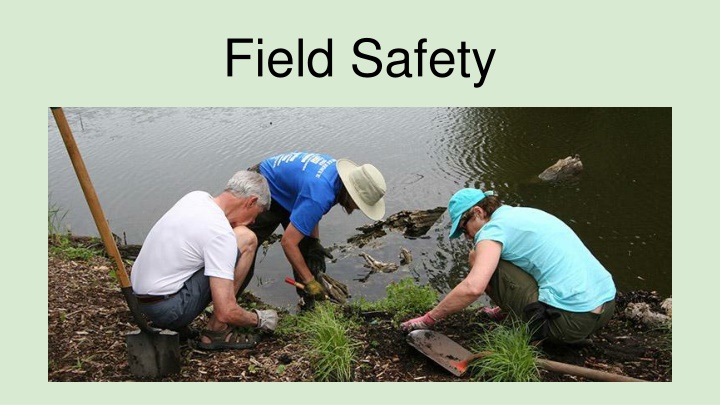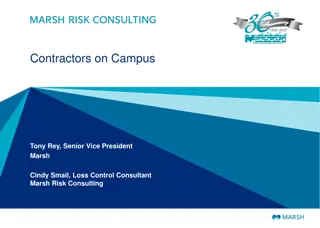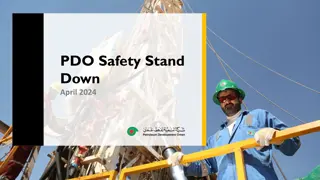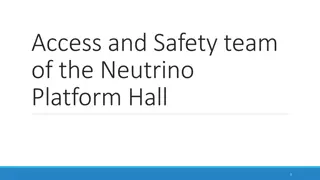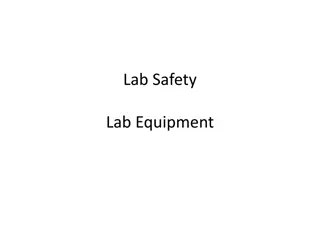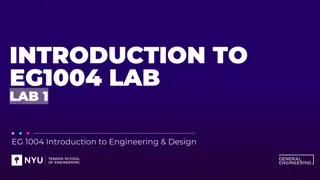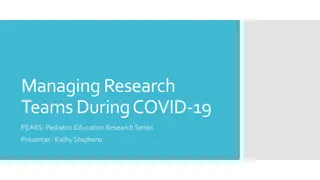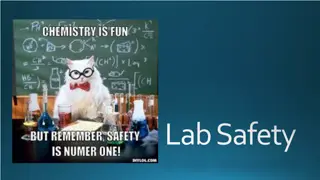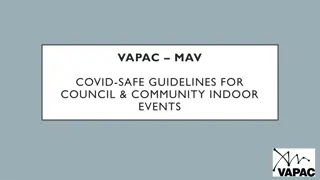Field Safety Guidelines for COVID-19 and Lab Work
Ensure safety in field and laboratory work by following COVID-19 protocols, implementing the buddy system near water bodies, pre-planning activities with a first aid kit, handling chemicals responsibly, adhering to boat policies, and meeting requirements for electro-shocker use. Detailed guidance and resources provided for safe field operations.
Download Presentation

Please find below an Image/Link to download the presentation.
The content on the website is provided AS IS for your information and personal use only. It may not be sold, licensed, or shared on other websites without obtaining consent from the author.If you encounter any issues during the download, it is possible that the publisher has removed the file from their server.
You are allowed to download the files provided on this website for personal or commercial use, subject to the condition that they are used lawfully. All files are the property of their respective owners.
The content on the website is provided AS IS for your information and personal use only. It may not be sold, licensed, or shared on other websites without obtaining consent from the author.
E N D
Presentation Transcript
COVID-19 and Field Work All students and faculty conducting lab exercises in the field must be aware of the current COVID-19 safety levels and information. Please make sure you are following the correct policies by visiting: https://www.gvsu.edu/lakerstogether/
The Buddy System While working in, on, or near water there must be two persons present for safety.
Pre-planning and a First Aid Kit Having a solid plan for the activities required in the field will help to prevent any injuries. Be aware of the specific hazards with your work (i.e. are you working with small animals that could bite, what protective gear might you need, weather, will you have chemicals with you, etc.). Pre-planning will also ensure that you have all of the right field equipment needed to complete the work. Always carry at least one first aid kit with you, these are kept in the field gear storage room. Please contact Diane Laughlin for access and check-out. laughldi@gvsu.edu
Chemical Transport Discuss with your PI or Instructor what is/is not allowed in the field. Chemicals should be in small quantities (< 1L), and transported in nalgene/plastic containers. Neutralizing materials should accompany any hazardous chemicals, as well as appropriate PPE. As much as possible, avoid carrying chemicals with you - you may be able to complete those activities once you return to the lab.
BOAT POLICIES Before going into the field or conducting laboratory work, make sure to share your plans (location(s), timing, cell number, etc.) with your research advisor. Research students requesting to operate the Jon boat must have a Michigan EIGLE Boater Safety Certificate (https://www.michigan.gov/dnr/0,4570,7-350-79119_79144_79642---,00.html) and must have read through, signed and returned the GVSU Biology Small Boat Policies and Procedures* document. Although the use of kayaks and canoes and other non-motorized watercraft does not require the boater safety certificate, all other polices (see above for GVSU Biology Small Boat Policies) must still be followed including wearing a Personal Floatation Device at all times. *
Electro-shocker Requirements When using the electro-shocker barge or backpack units, you must: 1. Be trained on how to use the electro-shocker. 2. Bring a Buddy with you. 3. Have the appropriate PPE: waders, gloves, first aid kit. 4. Have an AED unit with you and be trained on how to use it. 5. Bring a satellite phone along (and know how to use it). Contact Eric Snyder or Diane Laughlin for borrowing the AEDs or satellite phones.
Cold Weather Field Work When working in cold weather, please bring the following: 1. A Buddy. 2. A blanket and extra pair of warm clothes in case you become wet. 3. A first aid kit. 4. If on water, the survival suit see also Boat Policies in earlier slide. 5. You may also choose to bring along a satellite phone and an AED contact Eric Snyder or Diane Laughlin for access.
